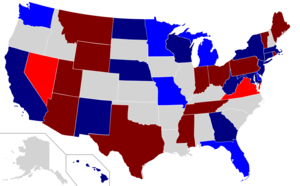- United States Senate elections, 2000
Infobox Election
election_name = United States Senate elections, 2000
country = United States
type = legislative
ongoing = no
previous_election = United States Senate elections, 1998
previous_year = 1998
next_election = United States Senate elections, 2002
next_year = 2002
seats_for_election = 34 seats in theUnited States Senate
election_date =November 7 ,2000
leader1 =Tom Daschle
party1 = Democratic Party (United States)
leaders_seat1 =South Dakota
last_election1 = 46 seats
seats1 = 50 "(gained control afterJim Jeffords chose to caucus with the Democrats as an independent in mid-2001)"
seat_change1 = +4
popular_vote1 = 38,164,089
percentage1 = 48.3%
swing1 = -1.2%
leader2 =Trent Lott
party2 = Republican Party (United States)
leaders_seat2 =Mississippi
last_election2 = 54 seats
seats2 = 50
seat_change2 = -4
popular_vote2 = 37,645,909
percentage2 = 47.7
swing2 = +0.9%
map_size = 320px
map_caption = legend|#800|Republican holdlegend|#f00|Republican pickupslegend|#008|Democratic holdlegend|#00f|Democratic pickuptitle = Majority Leader
before_election =Trent Lott
before_party = Republican Party (United States)
after_election =Tom Daschle
after_party = Democratic Party (United States)The U.S. Senate election, 2000 was an election for one-third of the seats in the
United States Senate which coincided with the election ofGeorge W. Bush as president. It featured a number of fiercely contested elections that resulted in a victory for the Democratic Party, which gained four net seats from the Republican Party in the Senate. (Democrats had already gained one seat since the 1998 elections when Zell B. Miller (D-Ga.) was appointed following the death of Paul M. Coverdell (R-Ga.).)This was six years after many Republicans had won seats in Senate Class 1 during the elections of 1994, and it was this group who were seeking reelection or retiring in 2000. Because such a large number of these seats were being defended by Republicans, most of the races that were considered to be in play were won by challenging Democrats. They defeated Republican senators
William Roth (R-Del.),Spencer Abraham (R-Mich.),Rod Grams (R-Minn.),John Ashcroft (R-Mo.), andSlade Gorton (R-Wash.), as well as winning the open seat inFlorida . Ashcroft's defeat was noteworthy in that his opponent,Mel Carnahan , had died before the election, but still won. (The Democratic governor had promised to appoint Carnahan's wife to the seat if he won). The Republicans did defeat one incumbent,Chuck Robb (D-Va.), and win an open seat inNevada .This resulted in the Democrats winning control of the Senate for only 17 days, since Al Gore was still Vice President and President of the Senate. But the Republicans won control the chamber with the tie-breaking vote of the new Vice President Richard B. Cheney on January 20th. The small Republican Majority would last until May 24, 2001 when Republican Senator Jim Jeffords of Vermont left the Republican Party and became an Independent who chose to caucus with the Democrats. The Republicans won back the Senate in the 2002 Midterm elections.
Notable races
Democratic gains
*
Delaware : Five-term incumbent Sen.William V. Roth, Jr. (R-DE) was defeated by outgoing GovernorThomas R. Carper (D). The age of the two candidates was an unspoken issue of the campaign as Carper's relative youth contrasted that of the 80-year-old Roth.
*Florida : Sen.Connie Mack III (R-FL) retired after two terms. Former CongressmanBill Nelson (D-FL) would defeat Rep.Bill McCollum (R-FL) in a close race that was nevertheless overshadowed by the contentious Presidential race in Florida.
*Michigan : Sen.Spencer Abraham (R-MI) was unseated after one term by Rep.Debbie Stabenow (D-MI). The contentious election was highlighted by a series of third party ads attacking Abraham's record on border security.
*Minnesota : Sen.Rod Grams (R-MN) lost his re-election bid to former State AuditorMark Dayton (D). An heir to a department store chain, Dayton was able to self-finance his $12 million campaign.
*Missouri : In one of the more unusual races of the cycle, deceased GovernorMel Carnahan (D) defeated Sen.John Ashcroft (R-MO). Carnahan died in a plane crash three weeks before the election which generated a large sympathy vote that pushed Carnahan over the top. His wife Jean received an interim appointment in her late husband's place.
*Washington : Sen.Slade Gorton (R-WA) was unseated for a second time by former CongresswomanMaria Cantwell (D-WA). Cantwell's campaign slogan of "Your voice for a change" referenced Gorton's "Time for a change" slogan he used when running againstWarren G. Magnuson in 1980.Republican gains
*
Nevada : Former CongressmanJohn Ensign (R-NV) defeated Democratic attorney and talk show hostEdward M. Bernstein for the seat of Sen.Richard Bryan (D-NV). Ensign had come within 400 votes of unseating Sen.Harry Reid (D-NV) in a Senate race two years earlier.
*Virginia : Sen.Chuck Robb (D-VA) was unseated in a close race against former Governor George Allen (R). Robb had survived a close call againstOliver North in the Republican landslide year of 1994, but could not defeat the popular Allen despite the year's Democratic trend.Democratic holds
*
Nebraska : GovernorBen Nelson (D) narrowly defeated Attorney GeneralDon Stenberg (R) for the seat of retiring Sen.Bob Kerrey (D-NE). Nelson had lost his previous bid for the Senate in 1996 against Sen. Chuck Hagel (R-NE).
*New York : The retirement of Sen.Daniel Patrick Moynihan (D-NY) appeared to set-up a showdown between First LadyHillary Rodham Clinton and New York City MayorRudy Giuliani . Giuliani, however, was forced to drop out of the race due to his being diagnosed withprostate cancer and a messy divorce from actressDonna Hanover . Clinton instead faced little-known CongressmanRick Lazio (R-NY), who could not match Clinton's fund raising abilities and name recognition. Clinton's election marked the first time a First Lady won elective office in American history.Republican holds
*
Montana : Two-term incumbentConrad Burns (R-MT) faced a surprisingly tough challenge from his Democratic opponent, rancher and future governorBrian Schweitzer . Burns narrowly won re-election.Results summary
Wikimedia Foundation. 2010.

